Personal view in to PCA by Carina Hansen
I have previously spent time as a volunteer worker in the Middle East, India and during the war in Angola, and lived in Brazil, but I have never seen such brutality and total misery as I did in the slums of Kampala, Uganda. A few years ago I had the opportunity to live in Kampala while conducting research as part of my RN training. This is where I met Paul Alita, a young Ugandan man who grew up in hardship on the streets of Kampala. He was fortunate enough to get help and rise above his situation, and has since devoted his life to help other children do the same.
The Home
- I was greeted at the House by Paul and three children. After Paul had shown me the office, the kids took me on a guided tour of the house and premises. First they showed me the House. There were a few bedrooms with bunk beds and a big common room that was used as a study for the children going to school, as a dining room, and also as a living room. In the backyard, children were playing and doing things children do when feeling safe. After a while Paul asked them if they wanted to show some acrobatics and dance. This was met with great enthusiasm.
Outreach Program- After an hour or so at the House, Paul told me that it was time to go to the outreach program before it got too late, as the kids were waiting for him. After a ten minute motorcycle-taxi ride, we had arrived and approximately twenty street kids were waiting. Here Paul had a container where he keeps sports and arts supplies for the kids to use. Some of the kids started a football game as soon as the ball was brought out, while others sat down in the shade to talk to the older children who had come down from the House. They talked about the importance of keeping clean, keeping drug free, staying out of trouble and the opportunities to get off of the streets to create a brighter future. - Many of the kids that we met through the Outreach Program, and also later on down in the slum, are not easily convinced or inspired. Their life has made them hard and tough, and they do not easily trust other people. However, everyone from the Outreach Program who talks to the kids have lived and struggled in the same way. They too have come from the streets and have made it out of that way of life. They know what the street kids are going though on a daily basis, and can communicate with them in the same language. - In Uganda, as in many places around the world, conflicts are known for using child soldiers. During the conflicts the children are broken down through violence and drugs to become brutal soldiers. An easier life is not waiting after the conflict, these children have seldom a family to go back to and they are not accepted back in the society they came from. For many of these children waits a life of segregation, more violence, poverty and famine. The Slum
- After a while we headed down to the slum.
- Paul brought me down to a garbage dump close to one of Kampala's slum areas to meet a gang of children, all former soldiers from northern Uganda. We arrived to a burnt out area soon learned that the gang had been driven away and that two of the children had been killed. I never got to meet anyone in the gang.
The day with Paul and all the kids had shaken me deeply but at the same time, it left me with a sense of hope. What we have and take for granted is a dream for many. Paul has the knowledge and the relations and he has come very far by working hard, he is running a home for children in need where they get psychological support, housing, food, health care and education. Many of the children have done very well in school and hope to be able to go on to university but the means are scarce and children many |
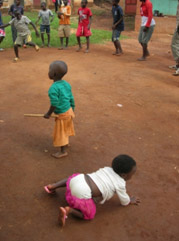
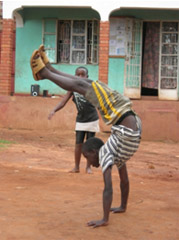
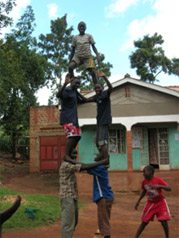
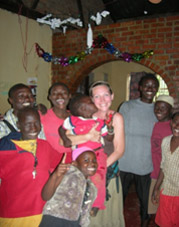
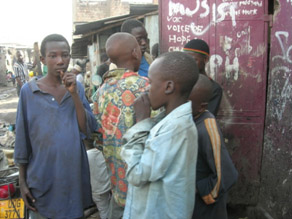
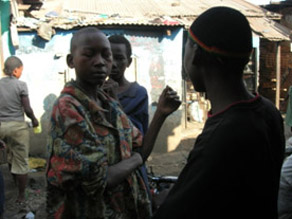
|